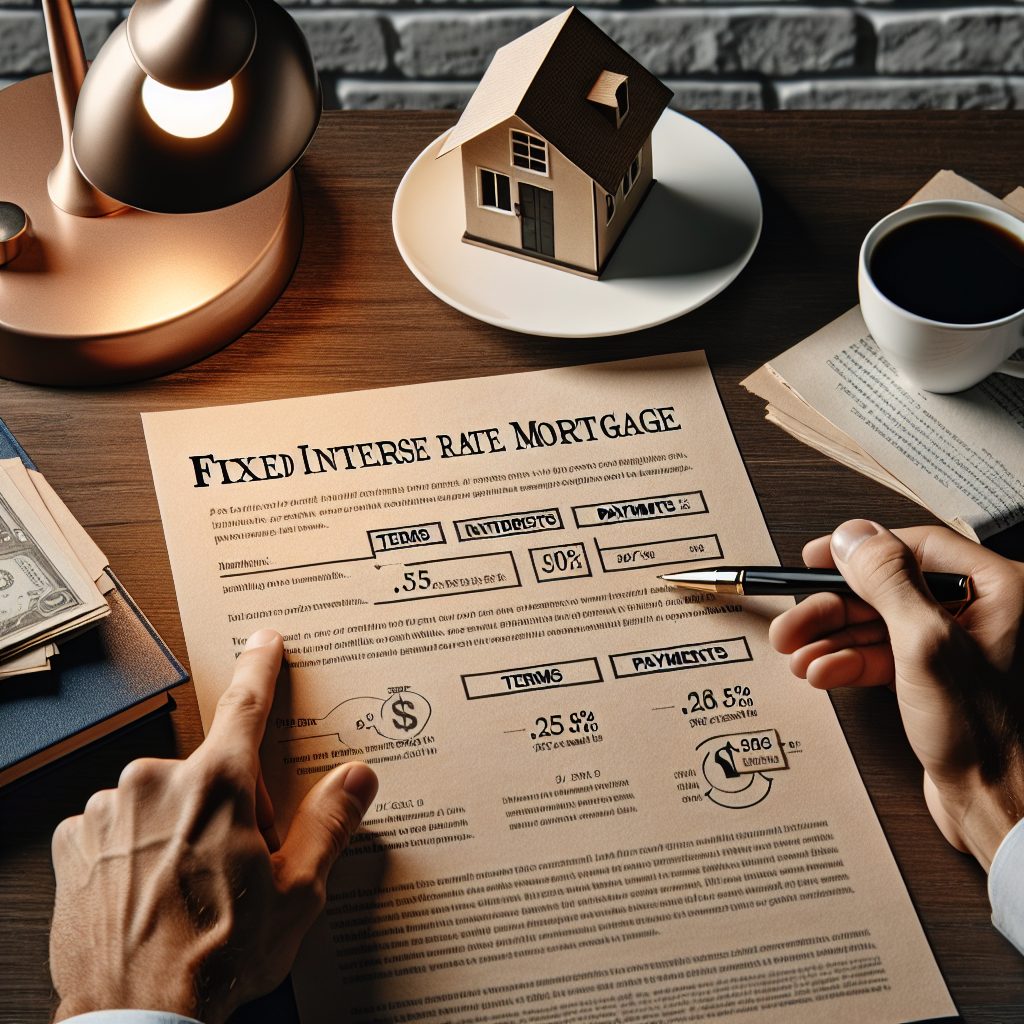
Fixed interest rate mortgage
Understanding Fixed Interest Rate Mortgages
When it comes to obtaining a mortgage, many prospective homeowners find themselves faced with a myriad of options. One of the most popular choices is the fixed interest rate mortgage. This type of mortgage provides borrowers with predictable payments and stability over time. In this article, we’ll delve into the intricacies of fixed interest rate mortgages, touching on their advantages, disadvantages, how they differ from adjustable rate mortgages (ARMs), and tips for choosing the right one for your financial situation.
What is a Fixed Interest Rate Mortgage?
A fixed interest rate mortgage is a loan that allows you to borrow money for the purpose of purchasing a home, with an interest rate that remains constant throughout the life of the loan. This means that your monthly payments do not vary, providing you with a sense of security and ease in budgeting.
The Benefits of a Fixed Interest Rate Mortgage
Choosing a fixed interest rate mortgage comes with numerous advantages, including:
- Stability: With a fixed interest rate, your monthly mortgage payment remains predictable, helping you to plan your budget effectively.
- Protection from Market Fluctuations: You are shielded from interest rate increases that can occur in the market, providing long-term financial security.
- Simplicity: The straightforward nature of fixed rate mortgages makes them easy to understand, even for first-time homebuyers.
Potential Drawbacks
While there are many benefits, it’s also important to consider potential drawbacks associated with fixed interest rate mortgages:
- Less Flexibility: If interest rates fall after you secure your mortgage, you will be unable to benefit from lower rates unless you refinance your mortgage.
- Higher Initial Rates: Fixed interest rates are often higher than initial rates offered on adjustable rate mortgages, which can be a barrier for some borrowers.
- Long-Term Commitment: Committing to a fixed interest rate mortgage typically means a long-term obligation that could exceed 30 years.
How Fixed Interest Rate Mortgages Compare to Adjustable Rate Mortgages
Another common mortgage option is the adjustable rate mortgage (ARM). These loans have interest rates that can fluctuate over time based on market conditions. Here’s a comparison to illustrate the key differences:
| Feature | Fixed Interest Rate Mortgage | Adjustable Rate Mortgage (ARM) |
|---|---|---|
| Interest Rate Stability | Fixed throughout the loan term | Variable and can change periodically |
| Monthly Payments | Predictable | Can change based on interest rate adjustments |
| Initial Rates | Generally higher than ARMs | Typically lower than fixed rate |
| Refinancing | Not necessary unless rates drop significantly | May be more beneficial if rates increase |
Determining if a Fixed Interest Rate Mortgage is Right for You
Before committing to a fixed interest rate mortgage, it’s essential to evaluate your personal financial situation and housing goals. Here are some factors to consider:
- Duration in Home: If you plan to stay in your home for a long time, a fixed interest rate mortgage may provide a stable long-term solution.
- Market Predictions: Assess the current economic climate and expert predictions regarding future interest rate trends.
- Financial Stability: Ensure you are in a position to handle the long-term commitment of a fixed mortgage without jeopardizing your financial health.
Tips for Securing the Best Fixed Interest Rate Mortgage
To help you secure the best possible deal when seeking a fixed interest rate mortgage, consider these valuable tips:
- Shop Around: Compare offers from multiple lenders to find the most competitive rates.
- Check Your Credit Score: A high credit score can lead to better mortgage terms, so it’s wise to check and improve your score before applying.
- Understand Your Finances: Have a clear understanding of your budget, housing expenses, and other financial responsibilities before committing to a mortgage.
Current Trends in Fixed Interest Rate Mortgages
As of October 2023, the landscape for fixed interest rate mortgages has evolved significantly. With various economic factors such as inflation, Federal Reserve policies, and market demands playing crucial roles, it is essential for borrowers to stay informed of current trends. Key observations include:
- Rates on the Rise: Recent data indicates a general upward trend in fixed interest rates, making it crucial to lock in terms as early as possible before further increases.
- Increased Demand: Homebuyers are leaning towards fixed rate mortgages for the assurance they provide in an unpredictable economic environment.
- Innovative Financing Alternatives: Some lenders are now offering unique products, including transient arms with capped rates alongside traditional fixed options.
Final Thoughts on Fixed Interest Rate Mortgages
A fixed interest rate mortgage can be an excellent solution for those looking for stability and predictability in their home financing. While it comes with its own set of advantages and challenges, careful consideration and planning can help you make the best choice for your circumstances. By staying informed and weighing your options, you can navigate the mortgage landscape with confidence and secure financing that aligns with your long-term financial goals.
"The key to a successful mortgage is not only securing the best rate but also finding a loan that fits your lifestyle and future goals." - Financial Expert
Whether this is your first home or you are considering refinancing, a fixed interest rate mortgage may provide the peace of mind and budgeting ease you need in your housing journey. Explore your options thoroughly, and don’t hesitate to reach out to experienced financial advisors.
By Guest, Published on July 30th, 2024